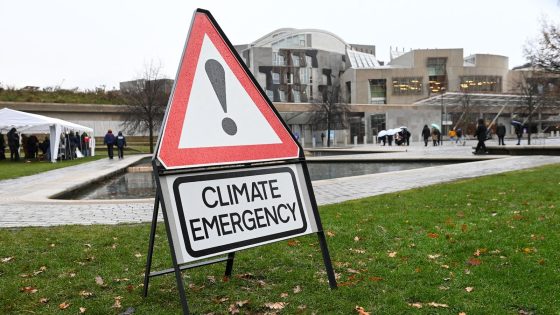The outgoing chief executive of the UK’s climate committee is warning the continued politicisation of net zero will end up hurting the economy, but so will unrealistic policies to achieve it.
When Chris Stark took over at the Committee on Climate Change (CCC), “net zero” was the science-based goal towards which the UK’s climate change policies had to be focused, he said.
“Net zero is now a concept that you can attack as a slogan,” he told Sky News.
“A bit like a container for all the culture warrior concerns that we have around some of the things that need to be done to get to net zero.”
He commended the government for the “remarkable” progress made on decarbonising electricity generation in the UK.
But Mr Stark said the recent shift in political rhetoric, starting with Rishi Sunak’s speech last autumn around the affordability of net zero, was likely to diminish progress.
“He framed net zero as a cost, I see it as an opportunity,” said Mr Stark. “If it is just about managing costs, then net zero is going to be very difficult to achieve.”
He has criticised some in the environmental movement for overzealous and unrealistic expectations of the government around environmental targets.
But Mr Stark also rejected the labelling of climate ambition as “woke ideology” by senior Conservative ministers, including Energy Secretary Claire Coutinho.
“Net zero, it’s not ‘woke’, it’s a serious thing,” he said.
“We led the world intellectually on the economics of climate change and we are still in the forefront globally, of modern large economies, decarbonising.
“It’s weird to me that we wouldn’t want to celebrate that.”
Mr Stark pointed to the rapid shift in the US toward low carbon energy under the Inflation Reduction Act, and the electrification of cars in countries including China. Economic advantages that the UK has a headstart in, but risks losing if it continues to focus on the costs of decarbonisation.
Read more from Sky News:
‘Real danger’ UK will miss growth without green plan, economists say
Abandoned coal mines providing cheaper, clean energy for homes
But he warned overambitious climate targets requiring policies that punish consumers, particularly poorer ones, would end in failure too.
Mr Stark argued Scotland’s recent abandoning of its interim net zero target – one that the CCC warned was likely unachievable – is a case in point.
Policies will only be successful if they make it easy, or at least affordable for consumers. And while carbon emissions need to be reduced urgently, for some things, there is time, he said.
“I think it’s only when you get to cheaper [electric] cars that you can have a discussion about that being a credible option for somebody who’s driving a petrol car – a banger – right now,” said Mr Stark.
Reductions in technology costs happening with things such as electric cars and devices like heat pumps will make them more affordable and ultimately, the cheapest option, he added.
But that positive message has been lost since he began leading the climate change committee, said the outgoing CCC boss.
“It’s a brave politician to make those arguments right now, because there’s voices in populism who are happy to tell you how hard this is going to be,” said Mr Stark.
“But in the end, other countries around the world are really rushing at this now, so we don’t want to miss out.”
Source Agencies





